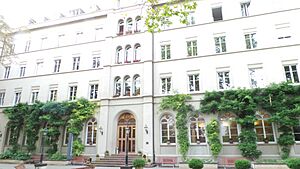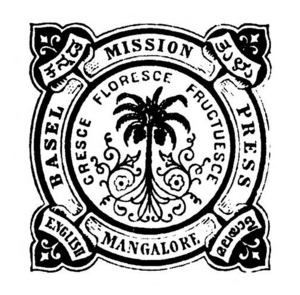Basel Mission facts for kids
 |
|
| Predecessor |
|
|---|---|
| Formation | 25 September 1815 |
| Type | Christian missionary society |
| Purpose |
|
| Headquarters | Basel, Switzerland |
| Location |
|
|
Region served
|
Worldwide especially Africa, Asia and Latin America |
|
Official language
|
|
|
President
|
Evelyn Borer |
|
Director
|
Jochen Kirsch |
| Website | Mission 21 |
The Basel Mission was a Christian group from Switzerland that sent people, called missionaries, around the world. It was started in 1815 and was active until 2001.
In 2001, its work was taken over by a new group called Mission 21 [de; fr]. Today, the Basel Mission helps support Mission 21. In 2025, the Basel Mission became a foundation, which is a type of organization that manages money for a specific purpose.
Contents
The Story of the Basel Mission
The Basel Mission began in 1815 in the city of Basel, Switzerland. At the time, people were worried that the French leader Napoleon would attack their city. A group of religious people, including both Calvinists and Lutherans, made a promise to God. They vowed that if their city was saved, they would open a school to train missionaries.
The city was spared, and they kept their promise by starting the mission. It was first called the German Missionary Society, but later changed its name to the Basel Mission.
A School for Missionaries
The mission opened its school in 1816. This school, called a seminary, trained people from different Protestant backgrounds to become missionaries. The school taught many subjects to prepare students for their work in other countries.
Students learned about:
- Religion: The Bible, church history, and how to be a pastor.
- Languages: They studied Greek, Latin, Hebrew, German, and English to help them translate religious texts.
- Practical Skills: Students learned math, geography, map-making, and even basic medicine and surgery.
Traveling the World
The Basel Mission sent missionaries to many parts of the world to spread their Christian faith and to help local communities.
They started their work in:
- Russia and the Gold Coast (modern-day Ghana) in 1828
- India in 1834
- China in 1847
- Cameroon in 1886
- Borneo in 1921
- Nigeria in 1951
- Latin America and Sudan in the 1970s
The first missionaries sent to the Gold Coast faced many challenges. Some became ill and died soon after arriving. But more missionaries, like Andreas Riis, continued the work.
Helping Communities Grow
The Basel Mission didn't just teach religion. They also wanted to create jobs and improve life for the people they worked with.
New Skills and Industries
The mission taught useful trades like printing, weaving, and making roof tiles. This helped local people earn a living. For example, the Basel Mission tile factory in Mangalore, India, became a well-known business that provided many jobs.
In 1841, the mission brought a printing press to Mangalore. They used it to print books and pamphlets in local languages like Kannada and Tulu. In 1843, they started the first Kannada-language newspaper, called "Mangalur-samachar."
Focus on Women and Children
The mission believed it was important to improve the lives of women. They sent female missionaries to act as role models and teachers.
In West Africa, the mission also worked to help children. At the time, many children were forced into hard labor. The mission provided schools where children could get an education and learn about Christianity, which helped protect them from these harsh conditions.
The Basel Mission Today
After World War II, the way the mission worked began to change. Instead of running things themselves, they started working with local churches in different countries.
The work of the Basel Mission is now carried on by Mission 21. This organization continues to work in many countries, including Bolivia, Cameroon, Chile, Indonesia, Malaysia, Nigeria, Peru, and Sudan. Mission 21 focuses on reducing poverty, promoting peace, and improving health and education.
Important Leaders of the Basel Mission
The Basel Mission was led by people called Inspectors or Directors. Here are some of the key leaders and the years they served:
- Christian Gottlieb Blumhardt: 1816–1838
- Ludwig Friedrich Wilhelm Hoffmann: 1839–1850
- Joseph Friedrich Josenhans: 1850–1879
- Theodor Oehler: 1884–1915
- Karl Hartenstein: 1926–1939
- Jacques Rossel: 1959–1979
See also
- Basler Handelsgesellschaft
- Protestant missionary societies in China during the 19th Century
- History of Ghana
 | James B. Knighten |
 | Azellia White |
 | Willa Brown |



